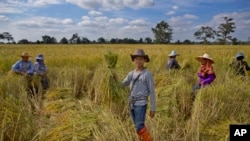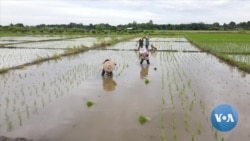The early morning sun peaks over the leafy Thai hillside as a crew of 20 migrant workers toss fresh rice seedlings into the soaked paddy fields, signifying the start of the rice season in northern Thailand’s Chiang Mai Province.
Speed and agility are the driving forces for the group of male and female laborers, mostly from neighboring Myanmar, who get paid by the hectare to plant the crop, earning as much as $35 a day, but working dusk to dawn.
The men and women have crossed into Thailand - some illegally - to earn a higher-than-average wage as word of rising rice production in the country translates into added days in the field.
Amid concerns about wheat shortages in Russia and Ukraine, Thai economists say demand for rice is set to rise this year, driven by the war in Ukraine and its impact on global commodity prices.
For Thailand, as the world’s third highest exporter of the crop - behind India and Vietnam - there is hope of added benefits for the workers.
While analysts predict Europe’s wheat shortage will help increase profits for rice producers as a substitute crop, many in the labor force face other obstacles.
“I want the government to help us farmers more, not just help the middleman, because we’re investing more money into this business than they are. Fertilizers are expensive, the cost of workers is high, and it’s not worth it,” says farmer Prajuk Kantiya, who oversees the work crew.
A weak Thai baht currency has helped make rice export prices more attractive but the long-term sustainability of increased rice production raises questions.
Economist Nisit Panthamit, a professor at Chiang Mai University, points out the need for a balanced plan and better technology that will encourage and support the next generation of farmers in Thailand beyond Ukraine’s crisis.
“The income of the farmer should be better and going up in the long run, but the productivity, how can you reduce the risk and reduce the cost of production that will be a sustainable way for farmers to gain on the world levels?”
Government research centers are exploring new technology to cut costs for Thailand’s agricultural sector.
“We are trying to incorporate newer techniques in farming in our “Young Smart Farmer” project, such as by using drones and other equipment that can lower the cost of farming and make it more convenient for farmers to plant their crops,” explains Nipon Boonmee, a director at the Chiang Mai Rice Research Center.
“We also have another project that focuses on experimenting with the environment's effects on different rice strains. For instance, we’re analyzing which species of rice can adapt the best to environmental changes and which days are the most suitable for planting because we understand that the world is changing,” Boonmee tells VOA.
While the plans sound good for the long term, local farmers currently face more pressing issues.
Added expenses, like rising fuel and fertilizer prices as a result of Russia’s invasion, along with the fallout from trade restrictions and price hikes have hit farmers’ wallets.
“As the price of the rice goes up, the amount of money we use to invest in supplies, like gas and fertilizer, will also increase, which it has. A bag of fertilizer used to cost 600 baht ($20) now it’s 1,000 baht.($30) It’s no surprise that the cost of buying rice has increased,” Boonmee adds.
Last month, Thailand’s prime minister, Prayuth Chan-ocha, announced plans to talk with Vietnam to discuss the possibilities of a joint global price increase on rice, though questions remain as to who will benefit.
“Even if the price goes up today, we cannot just immediately produce additional supplies,” explains economist Panthamit. “To make things that work in a sustainable way in the long term, we have to make sure to balance the supply and demand.”
Still, Thailand’s rice exports are benefiting from a rebound in global demand as the coronavirus pandemic eases. That means for workers like Kantiya, who was unemployed because of the COVID-19 lockdown, the future looks brighter.
“Even after my quarantine period, my post-symptoms made it hard for me to work,” Kantiya explains to VOA, as he rests at the edge of a newly planted field.
“I think there will be a higher demand for rice supplies because of all the war that's going on and I’d be grateful if I could get a good price on rice.”






